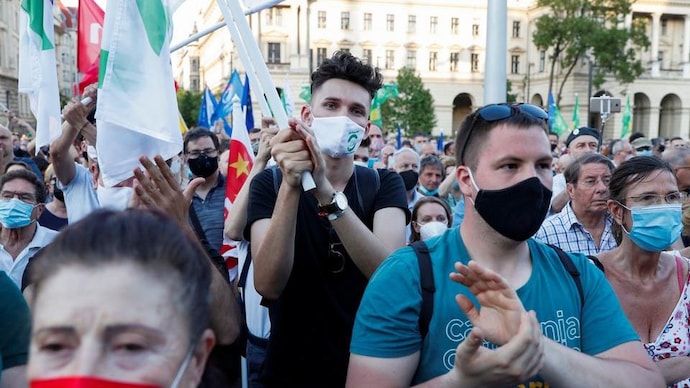Thousands of Hungarians, including teachers and students, on Sunday protested against the government by marching through Budapest. They demanded higher wages and a stop to the rapidly rising inflation that is destroying people’s incomes.
A few hours after nationalist Prime Minister Viktor Orban promised to maintain economic stability and maintain a cap on household energy bills even as the EU descended into an “economic crisis,” protesters carried banners reading “Orban get lost” and “No teachers, no future” as they crossed a bridge over the Danube.
Participants in the most recent of several anti-government demonstrations, however, said that the administration had let down teachers by paying them meagre salaries while the inflation rate, which peaked at 20% in September and is still increasing, was reaching intolerable proportions.
“I am here…for my children, there should be change,” said Gyongyi Bereczky, a mail carrier, who joined the protests for the first time. “This runaway inflation… we cannot save up at all anymore, simply we cannot make ends meet as prices are soaring.”
In recent years, teachers and students have demonstrated in support of higher pay, the ability to strike, and a solution to the growing teacher shortage.
Orban, who was reelected in April for a fourth consecutive term, warned earlier on Sunday that the conflict in neighbouring Ukraine would pose difficulties in the upcoming year as the nation observed the anniversary of the 1956 revolt against Soviet control.
“A war in the east, and an economic crisis in the West,” Orban told supporters in Zalaegerszeg, about 200 km (124 miles)west of Budapest, adding that there was “financial crisis and economic downturn in the EU”.
“In 1956, we learnt that unity is needed in difficult times… we will preserve economic stability, everyone will have a job, we can defend the scheme of caps on energy bills, and families will not be left on their own.”
Gas and electricity bill caps have been a cornerstone of Orban’s policy, but this year’s high energy prices drove up the cost of the programme, straining the state budget. From August 1, the government was compelled to eliminate the cap for homes with higher usage.
The 2023 budget is scheduled to be amended in December since the budget law, which was enacted in July, predicted growth of 4.1% and inflation of 5.2% for the following year—forecasts that have already been rendered obsolete by the rise in prices into the double digits. Currently, 1% economic growth is predicted for the next year. The forint hit historic lows earlier this month, forcing the central bank to raise interest rates as a last resort.























